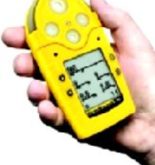Specialist electrochemical sensor manufacturer Analytical Technology (UK) announces that its electrochemical hydrogen peroxide (H2O2) gas sensors have been chosen by Bioquell to form part of its hydrogen peroxide vapour (HPV) bio-decontamination system, the Bioquell Q-10. The system effectively and safely bio-decontaminates rooms, equipment and electronic devices in hospital environments, eradicating problematic bacteria, fungi and viruses. The Bioquell Q-10 is a portable HPV system which uses H2O2 vapour to disinfect potentially contaminated areas in the fight against ‘superbugs’. Analytical Technology’s electrochemical gas sensors are fundamental to help optimise the HPV concentration to achieve surface sterilisation in the target area during the bio-decontamination process and for ensuring Bioquell’s Q-10 system has returned the target area to a safe HPV level prior to re-entry.
Germs or ‘superbugs’ can be easily spread in hospitals through human contact and on inanimate surfaces like telephone receivers and blood pressure cuffs. Every year, seven per cent of hospital patients contract a healthcare associated infection, making the eradication of ‘superbugs’ in the healthcare environment extremely important to patient safety.
Bioquell’s system, which integrates Analytical Technology’s electrochemical gas sensor technology, provides safe and repeatable sterilisation of hospital environments making HPV an effective replacement to traditional decontaminants such as formaldehyde, which has been banned for use in a number of European countries due to its carcinogenic nature. One of the benefits of this new treatment is that it can be safely used on sensitive equipment and electronics that are incompatible with chlorine-based products such as bleach. Moreover, the process is ’residue-free’, breaking down to water vapour and oxygen, representing an extremely environmentally friendly biocide and leaving no residual odour. As a result, Bioquell’s system can be used on a daily basis in fully functioning hospitals to decontaminate patient rooms and other units in less than two hours depending on the room size, materials and starting environmental conditions.
Due to the commercial constraints on the healthcare industry, Bioquell worked together with Analytical Technology to integrate a replaceable sensor into the Bioquell Q-10, removing the need for more expensive sensors that require regular checks and maintenance. They also developed a unique protocol for calibrating the sensors using H2O2, giving Bioquell a huge technical advantage over other solution providers.
Oliver Cumberlege, Head of Research and Development at Bioquell, comments: “Bioquell was looking for a cost effective H2O2 measurement cell to integrate into our sensor package. Working with Analytical Technology allowed us to add features to increase its sensitivity and response time and develop a package to a price whereby it is more cost-effective to replace the complete unit rather than re-calibrateâ€.
Since its development, Bioquell’s HPV system containing the Analytical Technology electrochemical H2O2 sensor has been adopted by the NHS in the UK and used across the globe in many hospitals to date.



